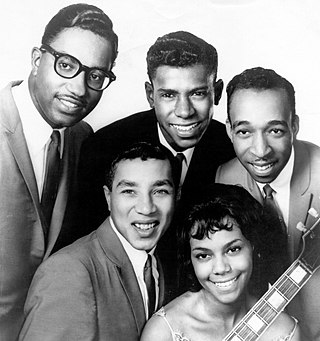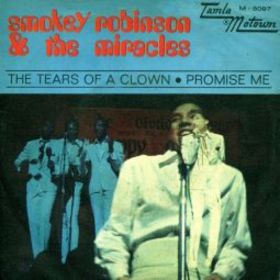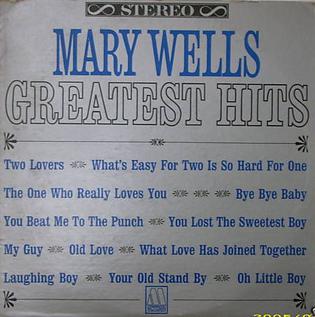
William "Smokey" Robinson Jr. is an American R&B and soul singer, songwriter, record producer, and former record executive. He was the founder and frontman of the pioneering Motown vocal group the Miracles, for which he was also chief songwriter and producer. He led the group from its 1955 origins, when they were called The Five Chimes, until 1972, when he retired from the group to focus on his role as Motown Records vice president. Robinson returned to the music industry as a solo artist the following year. He left Motown in 1999.

Mary Esther Wells was an American singer, who helped to define the emerging sound of Motown in the early 1960s.

The Miracles were an American vocal group that was the first successful recording act for Berry Gordy's Motown Records, and one of the most important and most influential groups in the history of pop, soul, R&B and rock and roll music. The group's international fame in the 1960s, alongside other Motown acts, led to a greater acceptance of pop music in the U.S., with the group being considered influential and important in the development of modern popular music.

Motown 25: Yesterday, Today, Forever is a 1983 television special, produced by Suzanne de Passe for Motown Records, to commemorate Motown's 25th year. The program was taped before a live audience at the Pasadena Civic Auditorium in Pasadena, California on March 25, 1983, and broadcast on NBC on May 16. Among its highlights were Michael Jackson's performance of "Billie Jean", Smokey Robinson's reunion with the Miracles, a Temptations / Four Tops "battle of the bands", Marvin Gaye's inspired speech about black music history and his memorable performance of "What's Going On", a Jackson 5 reunion, and an abbreviated reunion of Diana Ross & the Supremes, who performed their final #1 hit, "Someday We'll Be Together" from 1969. The show was co-written by de Passe with Ruth Adkins Robinson, who would go on to write shows with de Passe for the next 25 years, including the follow-up label tributes—through "Motown 40", Buz Kohan was the head writer.

"The Tears of a Clown" is a song written by Hank Cosby, Smokey Robinson, and Stevie Wonder and originally recorded by Smokey Robinson & the Miracles for the Tamla Records label subsidiary of Motown, first appearing on the 1967 album Make It Happen. The track was re-released in the United Kingdom as a single in July 1970, and it became a number-one hit on the UK Singles Chart for the week ending September 12, 1970. Subsequently, Motown released a partially re-recorded and completely remixed version as a single in the United States as well, where it quickly became a number-one hit on both the Billboard Hot 100 and R&B Singles charts.

Meet the Temptations is the debut studio album by the Temptations for the Gordy (Motown) label released in 1964. It includes most of the group's early singles, excluding only the first, "Oh Mother of Mine", and its b-side, "Romance Without Finance" ; as well as the single "Mind Over Matter", in which the group is credited as The Pirates. The album consists entirely of previously released singles, including the group's first hit single, "The Way You Do the Things You Do".

Love Child is the fifteenth studio album released by Diana Ross & the Supremes for the Motown label in 1968. The LP was the group's first studio LP not to include any songs written or produced by any member of the Holland–Dozier–Holland production team, who had previously overseen most of the Supremes' releases.

"Shop Around" is a song originally recorded by the Miracles on Motown Records' Tamla subsidiary label. It was written by Miracles lead singer Smokey Robinson and Motown Records founder Berry Gordy. It became a smash hit in 1960 when originally recorded by the Miracles, reaching number one on the Billboard R&B chart, number one on the Cashbox Top 100 Pop Chart, and number two on the Billboard Hot 100 chart. It was the Miracles' first million-selling hit record, and the first-million-selling hit for the Motown Record Corporation.

Meet the Supremes is the debut studio album by The Supremes, released in late 1962 on Motown.

The Supremes at the Copa is a live album by Motown singing group the Supremes, recorded during their debut engagement at the prestigious Copacabana nightclub in New York City. Released in the late fall of 1965, At the Copa was the first live album issued by the Supremes, and the only live album issued by the group's best-known lineup of Diana Ross, Florence Ballard and Mary Wilson.

Hi... We're the Miracles is the first album by The Miracles, Motown's first group, released on Motown's Tamla subsidiary label in January 1961. It was the first album released by the Motown Record Corporation. The album features several songs that played an important role in defining The Motown Sound and establishing songwriters Smokey Robinson and Berry Gordy.

Greatest Hits from the Beginning is a compilation double LP by The Miracles released in 1965. This was the first double album ever released by the Motown Record Corporation. It covers most of the group's hits from their pre-1965 albums, such as "Shop Around", "Who's Lovin’ You", "You've Really Got A Hold On Me" and "Mickey's Monkey", as well as the non-album singles from 1964: "I Like It Like That" and "That's What Love Is Made Of". The album was a success, reaching #21 on the Billboard Pop Album Chart. It was also the first Miracles album to chart on the Billboard R&B Album chart, where it was an even bigger success, peaking at #2.

Anthology, also known as Anthology: The Best of The Supremes, first released in May 1974, is a series of same or similarly titled compilation albums by The Supremes. Motown released revised versions in 1986, 1995 and 2001. In its initial version, a 35-track triple record collection of hits and rare material, the album charted at No. 24 on Billboard's "Black Albums" and No. 66 on "Pop Albums".

Get Ready is the seventh studio album by Australian pop vocal group Human Nature and third in their series Motown covers release. It was released on 17 November 2007.

"Your Heart Belongs to Me" is a 1962 song written and composed by The Miracles' William "Smokey" Robinson and released as a single by Motown singing group The Supremes during their early years with the label. The song is about a woman whose lover is in the armed forces and has "Gone to a far-away land"; its narration has her tell him to always remember their love for each other if he ever gets lonely.

Bye Bye Baby I Don't Want to Take a Chance is the debut album by Motown recording artist Mary Wells, released on Motown in 1961. The album didn't chart but yielded two hit singles for the teenaged Wells including "Bye Bye Baby", issued in late 1960, and "I Don't Want to Take a Chance", a song written for her by Berry Gordy and Mickey Stevenson. Wells' follow-up album, The One Who Really Loves You, was released in 1962.

The One Who Really Loves You is the second album recorded by R&B singer and Motown recording artist Mary Wells, released in 1962 on the Motown label. The album featured the hits, "The One Who Really Loves You" and "You Beat Me to the Punch" and other singles such as the ballads "Strange Love" and "Two Wrongs Don't Make a Right".

Mary Wells Greatest Hits is a greatest-hits compilation album released by Motown singer Mary Wells in 1964 on the Motown label. As the standout early star of Motown Records, Wells, thanks to producers such as Berry Gordy and Smokey Robinson, rose to prominence as Motown's first crossover star for a brief period between 1961 and 1964 before she left the label that year for 20th Century Fox Records. This collection collected the best of Wells' hits with the label.
For the phrase two wrongs don't make a right see two wrongs make a right.
"Bad Girl" is a 1959 doo-wop single by The Miracles. Issued locally on the Motown Records label, it was licensed to and issued nationally by Chess Records because the fledgling Motown Record Corporation did not, at that time, have national distribution. It was the first single released on the Motown label – all previous singles from the company were released on Motown's Tamla label. Although The Miracles had charted regionally and on the R&B charts with several earlier songs, including "Got a Job", "I Cry", "I Need a Change", and "(You Can) Depend on Me", "Bad Girl" was their first national chart hit, reaching #93 on the Billboard Hot 100. Written by Miracles lead singer Smokey Robinson and Motown Records' President and Founder Berry Gordy, "Bad Girl" is a sad, remorseful ballad about a young woman, whom Robinson, as the narrator, says "was so good at the start", but who later in the song "is breaking my heart". It is in the popular doo-wop style, as several of The Miracles' songs were during the late 1950s. The record's success, coupled with the distributor's failure to pay Gordy and The Miracles properly for its sales, prompted Robinson to urge Gordy to "go national" with it, meaning that Motown should do its own national distribution of its songs, and eliminate the middleman, to ensure that all money from sales of its records would go directly to the label.


















